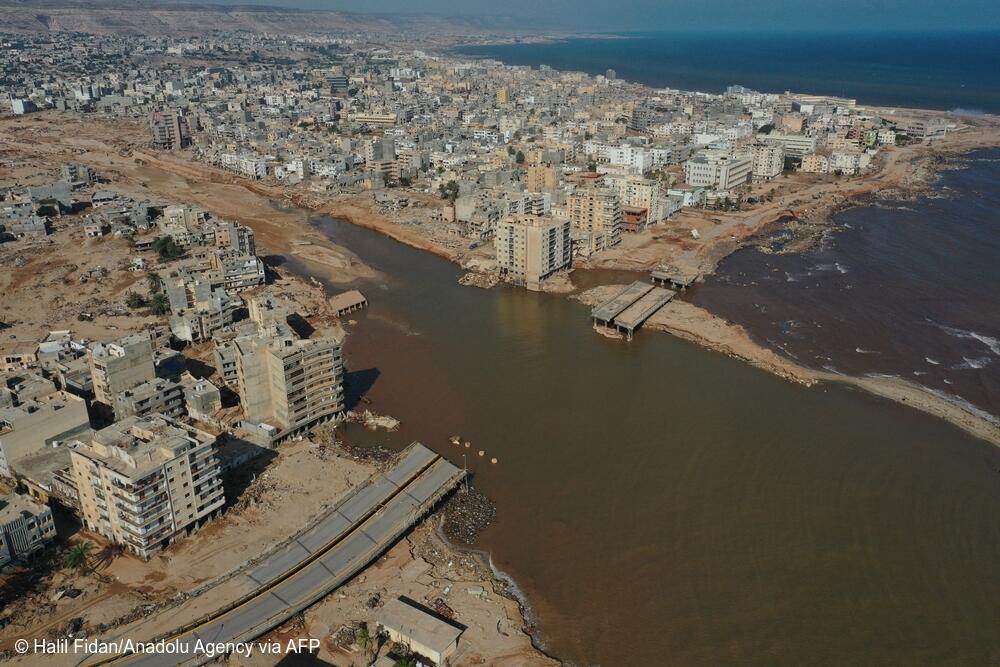Two weeks after Storm Daniel caused devastating floods that engulfed Derna and killed thousands in a few hours, search and rescue operations are about to end and reconstruction is starting. The need for psychological relief is immense among Derna’s people. MSF has begun medical activities, focusing on mental health support for people who lost everything, as well as for medical staff and volunteers. Michel Olivier Lacharité, MSF Head of Emergency, in Derna, explains
How is the overall situation in Derna, two weeks after the storm?
We can still see that the population is profoundly affected by that disaster. Many people have lost their houses or family members—often both. Clearly, almost everyone in the city is mourning and in pain at the moment. Two weeks after the floods, the retrieval of bodies under the rumble is not a priority anymore, while some bodies are still being recovered at sea. According to the search and rescue teams, the stream will continue to bring corpses in the coming weeks.
What was most striking, when we arrived in Derna, was the scale of the destruction. We talk about flooding, it's true, but it's really the destruction of the two dams starting the night of the 10th, while everyone was sleeping, that destroyed the center of the city and took everything and everyone away within a few hours. As a consequence of this massive flooding, there were relatively few people with wounds or trauma, but sadly, a high number of deceased.
Now the authorities are focusing on rebuilding a bridge between the eastern and western part of Derna, as the city has been literally split in two. Their main priority, health-wise, is to make sure that everyone who is traumatized or lost everything due to the floods is now receiving mental health support.
What about the healthcare system in Derna? Has MSF already been supporting health structures?
In terms of healthcare, the hospital system is not overwhelmed. There has been only a limited increase in the number of patients related to the disaster itself. The hospital system is coping well despite the situation and field hospitals set up by foreign governments, were operational a few days after the storm.
Primary healthcare structures have been particularly impacted by the disaster: some primary healthcare centers have been destroyed by the floods, and many medical and paramedical staff have either died in the flooding or are now mourning relatives or colleagues among the victims. Some primary healthcare centers are supported by many volunteers who came from all over Libya to help.
Two weeks in, we can see that a lot of health personnel are still missing or in the process of mourning, and the volunteers who came to help in the first days are starting to leave.
Since September 20, Médecins Sans Frontières started supporting two primary health care centers. To date, our doctors have already conducted 537 consultations in Embokh and Salem Sassi Primary Health Care Centers, and Oum Al Qura school shelter. The consultations were mainly for non-communicable diseases (diabetes, hypertension) for adults and respiratory infections and diarrhea for children. Many patients seen by our doctors were still in shock, some showing signs of psychological trauma. Some children would refuse to drink water fear of drowning. Patients complained of flashbacks, of being unable to sleep between 2:30 a.m. to 5 a.m —the precise time the deadly wave engulfed the city in the dark of night on 10 September.
What kind of support can MSF bring to these invisible wounds?
Our team of psychologists has been able to start providing mental health services to two priority groups among the population of Derna: those who have lost everything and are now living in temporary shelters; and medical or paramedical staff and volunteers working in health care facilities. Indeed, people in the latter group have sometimes lost relatives, colleagues, and friends, and on top of that, they are working on the frontlines, providing care to those who survived or even helping to evacuate dead bodies, which can be a traumatic experience for volunteers.
In that context, we have been putting all our efforts toward our mental health activities, including individual consultations and focus groups in shelters and in the two primary healthcare centers that we are supporting. We are planning to scale up our activities to offer mental health support to anyone who needs it.
Are our teams facing challenges?
While MSF’s staff could arrive in Derna only three days after the disaster, flying from western Libya where MSF runs regular projects, our action deployment, however, remains limited by the issuance of visas for the international staff, which can sometimes be a long process and could limit our capacity to scale up our activities. However, our collaboration with the authorities and with locally hired teams has been very good. We'll see in the coming days how the structures are going to be organized and review our setup according to the needs and our added value.
